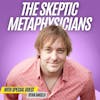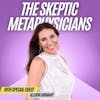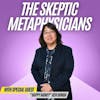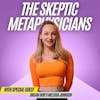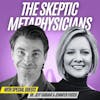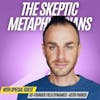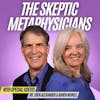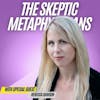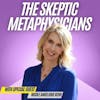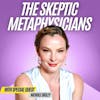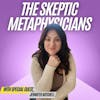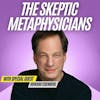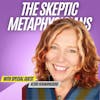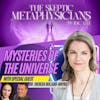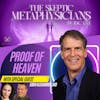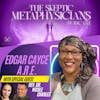The Witch of Amesbury and Expanding Consciousness | Stephen Hawley Martin
"The truth is not what historians have been saying up until now" -- Stephen Hawley Martin9/29/2021The Skeptic MetaphysicianThe Witch of Amesbury and Expanding Consciousness with Stephen Hawley MartinSummaryAs the talk show host of a popular weekly...
The Witch of Amesbury and Expanding Consciousness with Stephen Hawley Martin
Will: [00:00:00] Hey everyone. Welcome back to another episode of the skeptic metaphysician. I'm will. Your host is always in next to me as always. Of course, the lovely Karen Hensley. Karen, thank you for being on the show again today.
Karen: Thank you for having me back time and time
Will: again, time and time. I think there was a movie called that right time and time after time,
Karen: Cindy.
Will: Oh, maybe I am. I don't know. I'm getting confused. Well, Karen, I don't even know where to begin with this neck guest. I know. Amazing. It's so amazing. I'm truly in awe. The [00:01:00] hardest part about this interview is going to be limiting the scope of the topic. In in fact, there's so many topics we could talk about with this gentleman that, well, let's just let me just introduce him Good idea. He's not only a best selling author of more than two dozen books. That of course would be amazingly interesting to our audience, much more on that in a bit, but also had a very popular internet talk show called the truth about life, which delved into similar topics that we discussed on this show.
Now on that program, he interviewed dozens of near-death survivors, psychics researchers into the paranormal, as well as quantum physicists and medical doctors. And through it all realize that humankind is on the cusp of a transition and we're transitioning to a new understanding of the true nature of reality.
Does that not blow your mind? It does certainly blows mine. Well, he believes that this is going to result in the rebirth of optimism and that the world's going to come a better place to live in and that is something I know I would welcome. And I'm sure you would too. Oh, absolutely. So he gets even more interesting because he's also the former principal of [00:02:00] the world renowned ad from the Martin agency.
This is the agency Karen that created the Geico gecko.
Karen: I know. And even more so we in Virginia
Will: and the slogan is Virginia's for lovers and. The Martin agency came up with that slogan as well. Now he is currently an editor and publisher of the Oakley press, which specializes in parish, psychology and body, mind, and spirit topics, plus a whole lot of other stuff that are more mundane, but we're really interested in this stuff and he's won all kinds of awards.
I don't want to delay any more, bringing him on the show because he's been sitting really patiently and I'm super excited to introduce the show. Stephen Holly, Martin. Steve, thank you so much for coming on the show.
Stephen Hawley Martin: Hopefully. Thank you. Thank you so much. We'll I appreciate you having me.
I'm looking forward to our chat.
Will: Just to give a little bit of context into the conversation, you have a lot of information or you can talk very well about lots of different things, including life after death, reincarnation. Where the consciousness resides the meaning of life.
The science as is taught in schools, being based [00:03:00] on false premises, mean there's all kinds of stuff and not to believe the topic too much. I'm burying the lead. You're actually, your ancestor is someone who was accused, tried and executed as a
Stephen Hawley Martin: witch. Well, that's correct.
Susanna north Martin. Yes, she is my seven times. Great grandmother direct descendant. And I, you know, I heard about her growing up and it really kind of, I think shaped me in many ways in my brother and sister as well, because We do own, we don't take for granted what anybody says or, you know, go along with the crowd necessarily because she was accused, she was tried, she was convicted.
She was hanged. And by the way, that's the proper past tense of the verb to hang pictures are hung. My mother used to say, people are handing
Will: you.
Stephen Hawley Martin: Right. But anyway, yeah. And in fact, recently I've just released a book about her and called the witch of Amesbury show. That was what she's [00:04:00] called. In fact, if you Google that you'll, you can find out a lot about her, but yeah, I wanted to see whether she actually was a witch or.
Practicing witchcraft magic is what they meant by that back then. And it was against the law in that part of the world and in new England, because new England was a theocracy, was the Puritans had come over to set up a city on a hill. You've heard about that. I'm sure. that's what my investigation was about.
And I learned an awful lot because there is an awful lot of information available, all the transcripts from the trials, all the depositions that led up to the trials, peop people back then who were eye witnesses, wrote reports on it. So the name of the book is the the witch of Amesbury. And I say that she is the matriarch of an advertising dynasty because I think that having a witch in the family, cause one of the things that led my brother and me into the advertisements, of course, but dad was also in it.
My mother was in it. Now I've got three children who are in it. It is a dynasty.
Will: [00:05:00] In your material, you say that being descended from someone that was accused of witchcraft actually helped you and your brother build the ad agency. How does that so,
Stephen Hawley Martin: well, you know, We were always told.
And again, you have to read the book to find out whether she was really a witch or whether she was practicing witchcraft, but we were always told by my parents and my mother in particular, who seemed to be obsessed by the whole thing that she was falsely accused, that she was a good Christian woman who who was falsely accused and hanged.
And so it kind of kept us from, from just taking for granted what somebody in authority said that it was true. We didn't, you know, we always, certainly, I always questioned and, and I wanted to find out for myself because of that. And I think that it made me a non-conformist and. Create advertising that's breaks through the ball.
You gotta be a non-conformance you, you know, and also if you're gonna start a company, which my brother and I both did I think you have to have that little [00:06:00] extra something that says, you know, we can do it. And I think that really was imparted by my mother who kept harping on the fact that we had this switch in the family.
So, yeah, I think that it really did make us the people that that we became. And, and because of that, we started an ad agency. That's become just a tremendous success. And, you know, after I left the Martin agency, I started another one called Holly Martin partners, which we sold to the Interpublic group of companies, which is the New York stock exchange company.
So, yeah. I think that Susanna north Martin had a lot to do with it. Oh,
Karen: well, I loved how I was, I was reading some of the material that you sent over and I think you called yourself an early feminine. And I would imagine that learning about all of this witchcraft and how they treated women in the trials and everything you learn so much more than just about the witchcraft, but also how women were, you know, making their way through society at the time.
Stephen Hawley Martin: Absolutely. Yeah. The old, most of the people who were accused of which being witches and practicing magic and witchcraft were women, not all of them. There were a couple of men that [00:07:00] were also accused, but the vast majority, I think something like 19 of the people who were executed were women out of 21, man was also hanged.
And another one was killed before he was even tried because they were trying to force me plea out of him. They piled rocks on his chest and eventually in his chest, finally collapsed has famous last words were more weight,
but yeah, I, I w definitely an early feminist, my mother Kind of instilled that into me. My father died when I was only six years old and she was left with two children. My brother had already gone off to college. He was quite a bit older than me, but my sister who was a 12 or 13 and I was six or seven when he died and she had to go out and work and she then she went out and got a job.
She worked for an ad agency. She became the office manager of the, the agency. She really did very well and [00:08:00] raised two, two kids without a husband and sent us both to good colleges. My sister went to William and Mary and I went to Hampton Sydney. And so. And my grandmother. So I had my sister, my mother and my grandmother lived with us.
So I li I grew up, I was raised by three women and know I figured women could do anything men could do. And I still believe that. So there you go.
Karen: Okay. I have to tell you you're right.
Will: Said like a true feminist, So everyone knows about the Salem witch trials. That's what we're talking about. All these, these women and, and certain men that were accused of being practicing witches and which was in the Puritan in puritanism something they couldn't abide by, right?
There's even a mistranslation of the Bible that says never suffered, which to live. This kind of thing. Everyone knows about the Salem witch trials, but is, Salem, are those the only ones that actually took place in this country?
Stephen Hawley Martin: No, not at all. There were several witch trials, but just of one individual, I think there [00:09:00] were three different ones that I'm aware of prior to the Salem witch trials that they were in Connecticut.
But that was still part of the Massachusetts bay colony. You know, the Massachusetts bay colony was chartered by Charles the first to be a. A place where the Puritans could go and have a country of their own theocracy. So the Bible was the law to them. And you mentioned about don't suffer a witch to live that's in Exodus.
I believe, you know, the 10 commandments are given an ex jus and a whole bunch of laws after that, that the Jewish people, still many of them still go by. And one of them has to do with the one you just said about not suffering, which to live, but yeah, there were at least three trials where women were accused, tried and executed.
One of them. I found very fascinating and I talk about it in, in my book. The name of the lady was goodie Goodwin. And she was a washer woman who apparently [00:10:00] really was practicing witchcraft. In fact, if you, in reading about her, she was written about extensively by cotton Mather. She apparently had a pact with the devil.
At least she thought she did not today. I believe probably people would she'd be diagnosed as being schizophrenia because she would be constantly talking to say she called him her prints. And she had a effigy dolls that she used to torture people with when they tried her someone, one of the judges or whatever, brought one of her effigy dolls into the courtroom and handed it to her.
And she started stroking it. And one of the people who was an accuser fell on the floor in a, B like they were being told. Because she was stroking this effigy doll. So yeah, she she had went to the gallows was hanged and there were a couple of others too. So yeah, it, it, it was not the only one and that happened not too long [00:11:00] before the Salem witch trials.
And I think one of the things that probably led to it in that people were kind of worked up about, you know, having witches around. And and so it really took off, there were 150 people or more who were actually accused only about 20 were executed, but yeah, it was, it was quite a, quite a, quite a bit of.
Yeah. So,
Will: How did all this hysteria start? If someone just see something or do someone get angry with someone and says what it is?
Stephen Hawley Martin: Well, you know, there's a lot of speculation that there might've been some of that going on, but the way it got started, there were some children, the preacher, the Puritan preacher in Salem, actually, there are two towns, Salem town and Salem village.
The preacher in Salem village had a couple of children and he had a couple who were from Barbados who were slaves Tituba and her husband, John, and.[00:12:00] Apparently during the winter of 16 91, 92 they, the preacher and his wife were spending a lot of time away talking doing their, you know, their ministry where, you know, people were ill or people had to be buried or whatever.
And the kids were watched by mainly by tissue, by the Barbado black slave. And apparently she entertained the children with her with kind of magic tricks. She had grown up with fooduh in the Caribbean and she did fortune telling and so forth. And. That was strictly against the law in Salem and in Massachusetts at that time magic, anything to do with magic, there was against the law.
In fact there, there were three degrees of magic and, and one of them was a white magic where you used horseshoes or you used a, a rabbits, those kinds of things. And then there was black magic, which was when you [00:13:00] conjured up a spell, particularly to curse someone or to curse their animal.
And then of course the highest degree was the one that goody Goodwin was guilty of, which was the pack with the. But she was practicing these magic tricks and suddenly that after a while the kids fell ill and there were the two girls that lived in the house who were the daughters, but they had friends over and the friends protest painted this.
So there was, there were half a dozen or so young women and girls aging from something like eight or nine up to about 16 or 17 who participated in all this. And they suddenly began to think that they were being attacked by what they call specters specters, being like a ghost of people coming to them, to them and torturing them.
And they'd be lying on the floor, writhing in pain and that sort of thing. So the the preacher wanted, define, wanted to get to the bottom of it. And he asked who was doing this to them? Who was it? Who were, who were, who were the specters [00:14:00] of. They that children ended up first accusing the town beggar.
Her name was good. Was her last name? Goody good. And she was a logical one to accuse, I suppose, because she would probably look like a witch and she was going around, you know, begging and stuff like that. So that's how it got started, but then it spread it just spread like wild. Oh yeah. So this
Will: all, because a couple girls had a couple of nightmares.
Stephen Hawley Martin: Well, I think it was more than nightmares, you know, I think that probably they believed. One of the things I did, I believe that they believed they were being attacked because of the, you know, when you believe something strongly enough you know, it, you can produce all kinds of things.
Will: You pull up a great point it is a conversation I want to dive into because you do think that those that say that the girls were faking their symptoms are off the mark.
Right.
Stephen Hawley Martin: You know, I think that probably some people during the course of the whole thing were faking, but I don't think these girls were [00:15:00] one of the things I did was I had heard stories about how people who use one of those boards called tell fortunes. Yeah. And I Googled that. I Googled We do board Weegee boards.
Yeah. I Googled Weegee warning and I got like a million hits. And on the first page, there were all kinds of stories about people who'd been been using these Weegee boards and suddenly things, paranormal things started happening to them. There was one lady who was they were they apparently had a.
Firefighter from nine who died in 1935 was coming through the wigi board, was asking, answering questions and they were asking him all these questions. And this one lady who was taking part in this became paralyzed and couldn't talk. And her friend looked around at her. And then she looked at the board, she picked up the board and she ran and she threw it down the steps into the basement.
And. The lady was finally able to, you know, get her pain to move again and [00:16:00] talk again. But those that's just one of a bunch of stories. So, you know, maybe the baby, there's something to the idea of trying to use magic to communicate with the other side. Things can get out of hand. I don't know, but I do know that they probably really thought they were being attacked by specters.
Karen: We do board out of the house.
Stephen Hawley Martin: Yeah. I think the next day they went down and got it. And they threw it in the dumpster in the back.
Will: The only thing I've ever had to have is I keep getting accused of, of moving the Weegee thing
Stephen Hawley Martin: and then it moves by itself. Doesn't it? I've never done it. Right. Tell me about that.
Will: So, so some people think that when they use a Weegee board, you can actually be possessed by a demon or something like that is what, what are your thoughts on that? Is that?
Stephen Hawley Martin: Well, I do think that, you know, that's another thing that I, I looked into very [00:17:00] carefully and something that I, when I had that that weekly podcast you mentioned, I talked to two different psychiatrists.
Who treat. Possession not they're not priests or preachers. They're psychiatrists, MDs, who, who actually one of them lives in in West Virginia and wheeling West Virginia. And she's I tell I've interviewed her twice and she is very clear that you can be possessed and that there are different levels of possession there's obsession, which is when you're somebody who's just kind of in your space and your aura from the other side, who's influencing you.
But possession is when they actually take over your body. And that is rare, but it does happen. And in fact, the Catholic church still has a. It still does. Possession has to be a Bishop to do it, and they have to be approved by the Bishop, but they have something like a 27 page [00:18:00] manual on how to do possess.
I read a book by a guy named yeah, the Exorcist, a priest who had worked in the Vatican bin. His name is Malecon Martin. And he, he wrote a book that had case histories of five exorcisms that the Catholic church had done in modern times. The book came out probably 40 years ago, but it is scary stuff. I mean, it was very much like the Exorcist.
I mean, if you could see
Will: she, I don't think I've ever seen her quite this freaked out.
Stephen Hawley Martin: Yeah. One of the things that the psychiatrist, you know, told me was people who obsess about. The possibility of Satan being [00:19:00] real and that you might be possessed and you have to watch out everything you say, and then they're kind of it's on their mind are much more likely to actually have it happen to them.
And certainly these little girls in Salem, I'm sure were obsessed about it because they'd heard about, they'd heard about goodie Goodwin just recently being hanged for it and being in a pact with the devil. And there was a lot of conversation going around about how you know, The Indians, they were worried about those and they thought the Indians were devil worshipers.
And so it was on their minds and their father, the preacher told them, you know, not to do what they were doing, which was playing around with magic, with Tituba. So, you know, I think that if they pop, possibly could have been possessed to a certain extent. So
Karen: would you say possession is only the only Satan?
Because if that's the case, I don't really believe in the devil, so I feel like I'm safe, but I do [00:20:00] believe in other spirits. So if they can possess you, then I got a problem.
Stephen Hawley Martin: Well, no, I, it, the, you can be possessed by. Other spirits and doesn't have to be Satan according to these, these psychiatrists. In fact, it's much more common to either be obsessed or possessed by someone who is just a spirit.
Who's kind of stuck on, on the earth plane. You know, when you you're, I'm sure familiar with the near-death experiences where somebody leaves their body, they see their body, and then they see the light out of a tunnel and they go to the light and then they're greeted there by aunts their father or their mother or their grandmother or somebody that they knew was passed on before.
Well, some people don't do that. Some people eat perhaps they're, they don't believe there's a life after death. They may not even know they're died for a while. They have to figure it out. And some people don't want to go to the light because they're afraid they're going to be. Judged and that, [00:21:00] or that they might be, that might be the way to hell or something.
So they stick around on the earth plane and they look for someplace to hang out and they might, they can, they can actually possess somebody or, or obsess them. One case history that one of the psychiatrists told me about that she had dealt with was a woman whose father was not really possessing her, but obsessing her.
He was hanging out with her in her, you know, in her space, in her aura. And one of the ways, one of the ways that manifest was that she would have physical symptoms that tracked along with the kind of problems that her father had had. And eventually they figured out that's who it was. And they talked him into going on to the light and told him know.
He'll be a lot better off there. And he eventually did. He went away. Yeah. So you bring up
Will: an interesting point then. Cause then the skeptic in me has to say, [00:22:00] you just mentioned not long ago, that belief probably has a lot to do with it. So the power of suggestion on someone's mind is pretty powerful.
Could it not have been something that you, the girls that originally started this whole thing or people who now are possessed by the way to Karen's phase could not be more freaked out as he started talking about, could it not have been like whatever you think is going to happen? Can't we all just see whatever we think happened happened.
Like, could we fool ourselves into saying that that's that's what's happening here or the,
Stephen Hawley Martin: I think that that is a strong possibility. In fact, I think that the my analysis of the whole. Hysteria that took place there in Salem. And the fact that people thought they were being possessed has an awful lot to do with their belief systems.
And it could be the whole thing like you're suggesting, but I believe it's really a combination [00:23:00] of, they believed that could happen. And it did happen like you said, but there were probably actually some paranormal stuff that was going on that they did open the door between the two worlds and had little, just like the Weegee board thing.
And, and so I think it was a combination of those things. I do believe that belief is extremely powerful and that people who believe that something is going to happen often bring it upon themselves. I'll give you a simple example. There, people used to think that sitting in a draft would cause a cold.
And so they would sit in the draft and they would catch a cold, well, Coles don't aren't caused by graphs, Coles or draws caused by viruses. And, and so what happens is they think they're going to get a coal because they were in this draft and they get it because somehow their immune system allows [00:24:00] the virus in.
And there's all kinds of viruses around us all the time. And sometimes we get sick and sometimes we don't, and it's a question of whether or not the immune system keeps it out or attacks it or whatever, and puts it down. So the belief does lead to the result. It's not to say that, you know, that viruses don't exist, they exist and the person got it.
And wasn't, but it wasn't because of the cold air that was all in the back of their neck.
Okay.
Will: So
Karen: I have a question for you that isn't about belief necessarily, but it is about witches. I read somewhere and I wanted to get your take on this. That once a person was executed for being a witch, that when they were buried, they were decapitated and their head was separated from their body because the belief was that if their body was separate from their head, then they couldn't go to heaven.
Have you read anything about that?
Stephen Hawley Martin: Well, what I have read about that and, and found out that in the United States, in what became the United States in north America and [00:25:00] in England, Which is were hanged in, on the continent and France and Germany and Spain and so forth. They were burned at the stake. The reason they were burned at the stake was exactly what you said, just to get rid of the body, you know, and, and they didn't, I guess think they went, but they wouldn't go to heaven anyway, since they were in a deal with the devil.
But it was so they didn't come back. I guess his homies, where as here in an, in Massachusetts, those who were convicted and executed could not be buried in the, in the. The town graveyard or the church graveyard, they had to be, they were buried somewhere else, but I don't think that the heads were cut off.
That could be, I didn't, I'd never read that, but they were not allowed to be varied in a spot where, you know, Christians were buried.
Will: So. I got to ask Karen,[00:26:00]
Karen: just curious. Many years ago I had a situation and I will tell you, I believe in everything and I don't believe in everything, but I believe in your stuff, do my research and
Will: you don't believe in astrology, but everything else.
Karen: So anyway, so I had a situation where I woke up one night and there was a man in my bedroom with a knife and I got away and it all worked out for the best, but at the time that that happened, I could sleep through a hurricane.
I could sleep through anything and But for some reason, him like pushing him, whatnot. My television woke me up and fortunately, and I was able to get away, but I remember everything about that incident and specifically what I was dreaming. And in my dream, I was in an old house. I'm not sure where, but I was speaking with a woman who, a spirit and we weren't having a conversation, but I think I was asking her questions and she was answering with Knox.
And somehow I [00:27:00] figured out that she wanted me to. Take her head and put it with her body because she had been decapitated and then she could go to heaven. So after this, after this incident, I woke up and I called the police, whatever, all that stuff. And a few days later when I was a little more calm, I went to libraries and started doing some research.
And that's where I read a couple of, of, I don't know, books or articles about this and talking about, you know, dreaming. And if you're doing about spirits, it can be a warning if you're not afraid and all of this, but then if. Which is where people that had been decapitated, because the belief was that if their head was separated from the body, there's no way it could be together and they could go to heaven.
So that's, that's why I was asking, because I believe someone woke me up and saved me from that because there really is no reason I should have been woken up. I mean, there was stuff to tie me up a knife, like the whole shebang and I, and I got out. Unscaved, I'm glad I asked.
Stephen Hawley Martin: Well, it sounds like you, that was a horrible thing, but maybe she did wake you up. [00:28:00] I mean, you're
Karen: drinking. I totally believe I totally believe she did, but I didn't know if maybe she had been a witch and, you know, she was asking for my health and the stream somehow. I don't
Stephen Hawley Martin: know. No, I haven't heard about the decapitation a thing, but You know, I don't think that would keep you from going to heaven.
I mean, you, you could be blown to bits in a Tomic blast. You know, the body, the body and the consciousness are not, they're separate, you know, the brain is a receiver of consciousness, not the creator of consciousness. You mentioned earlier about the whole idea that a science as it's taught in the school today is based on a false premise.
And that's certainly what I believe. And the false premise is that the only thing that exists is material, substance, and therefore material substance would have to produce consciousness and material. And that would mean that there could have been no intelligence, no consciousness until evolution [00:29:00] produced a brain, which to me.
It makes no sense at all because and you can see all the intelligence in the universe from the beginning, you know, all the laws of physics and everything else that that would require intelligence DNA, for example, that is the building block of life. Of the coiled helix helix inside the DNA molecule is if you stretch it out six feet long and it's, it's, it's like computer code, everybody's seen printouts of DNA.
And that computer code, like a thing is what tells the cell when and how much protein to make and what kind of protein and you know, how could all of that whenever you see computer code or anything like it, like language written language, there's gotta be intelligence behind it. Yet. Intelligence couldn't have happened until evolution produced a brain.
If that premise of [00:30:00] scientific materialism is correct. Wow,
Will: well, you live just. A huge can of worms. It turns into the conversation, right? Because you've talked about consciousness, not being confined to our brains. You've talked about science based on a false premise now based on what you're talking about in terms of intelligence, you talked about where we were before the brain was evolved.
And now you have mentioned that you feel that there is evidence for life after death and reincarnation. So I, it kind of thing that gets all maybe wrapped up into the same general principles, but why do you say that consciousness is a, for lack of a better word beamed into the brain rather than where consciousness lives?
Stephen Hawley Martin: Yeah, a good question. And, and really Important question. I think, because it all goes to the reality [00:31:00] that I believe that people are beginning to realize, and that is the reason I believe that there are so many reasons, but let me just start with some scientific ones consciousness confined to the brain.
Quantum physicists don't believe that. And the reason they don't believe that is because of something that's called the double slit experiment. Have you ever heard of that? Yeah. The double slit experiment is, goes back more than 200 years to I've forgotten the guy's name, but you take two slips that are very thin and you shine light through them.
And. You will get a wave pattern where it's shows that light is a wave it by way pattern, I mean, light, dark, light, dark, where those peaks over come together and the families come together and you get lied to got a [00:32:00] zebra pattern. Okay. If you, if you close one of those slits, you will get a kind of a round kind of light on the wall.
Okay. Well that experiment, as I said, I think it was first done in 18 of three quantum physicists know from Einstein and experiments that he did that light is a, are particles, photons, photons. And so. What they have done is that experiment, but have a photon gun that shoots a photon through the slits one at a time.
Now, if you do that one at a time, you will still get, and you have both slits open. You will still get the zebra pattern. Now, how could that be? Because [00:33:00] you would think you'd get the little spots up on the wall. Now, if the scientist has a gut has keeps a record of what spot was shot by what gun, through what slit, if he keeps a record and knows you get all the little spots on the wall.
So the fact that he knows the fact that he's conscious.
Determines the outcome of that experiment. If he doesn't know he gets a zebra pattern. If he does know he gets the spots of the wall, where they hit, because he knows where they hit and that experiment has done been done in laboratories all over the world. And it has been done in various configurations where they measure where the photons came from and what, what slip they went through before the slits and after the slips.
And then they've done it before the slits and after [00:34:00] the slits and erased the information every time they do it, no matter which way they, they do it, it comes out the same way. If the scientists know. You get the spot, you have to decide, just doesn't know you get the slips. So
Will: that's like a practical version of Schrodinger's cat, right?
If the cats alive and dead, same time. And only when you open the box to find out, do you know whether the cat is actually alive or dead in this reality?
Stephen Hawley Martin: Exactly. Those, yeah. Let me give you some more information about that. Yeah. So let
Will: me blow your mind some more willing. Karen is basically what you're saying.
Okay.
Stephen Hawley Martin: I live in Virginia. I live in Virginia. There's this place called the university of Virginia. That's up the road for me in Charlottesville. And there was a guy named Ian Stevenson who was a [00:35:00] psychiatrist taught in the medical school at the university of Virginia who got interested in reincarnate.
Back in the early sixties. I think probably he, he started in 1961 or 62 investigating children's memories of past lives. And the university of Virginia has been studying that ever since. So that was almost 60 years. So they're still doing it now. They're still doing it today. In fact, after a few years, Ian Stevenson was given a grant by the guy who invented the Xerox machine, millions of dollars, who happened to be interested in the same subject.
And there's a something that's called the division of perceptual studies that was created. That's Ian Stevenson led up until 2007. When he died or maybe he's [00:36:00] retired for a little while before that, but anyway, it's still going on. It's now led by a man named Jim B Tucker. Who's a psychiatrist, a child psychiatrist.
So they been studying children's memories of past lives. And what they do is that child children will typically start talking about this when they're around two years old, when they learn to talk, when they start talking and they'll talk about it up until they're about six usually, and then, then it'll just fade away.
But what Stevenson did was when one of these cases would come about, he'd check them out and see, you know, the guy and classic study. One that I put in one of my books life after death, powerful evidence, you will never die. So the name of that book. Is a world war II pilot. This kid was born in 1999 and in the early two thousands, when he was about 18 months old, he started talking about.
[00:37:00] First he had nightmares. Then he would say that he was in a plane and he was crashing and the plane was on fire. Long story short. His parents would ask him questions. He was able to, he said that he, he was a pilot in world war two, that his plane was shot down at the battle of Iwo Jima that he saw them on the beach at where the pink hotel was in Hawaii and he thought they would be good parents.
And so that's why he went with them. He knew the names of the, of his, his friends on the sh on the ship who were fellow pilots and crew. He knew the name of the aircraft, carry the Natoma bay, all this stuff. And you know, that is a typical. But a very poignant example of the, kind of the research the university of Virginia has been doing on children's memories of past [00:38:00] lives.
They now have 2,500 plus case histories that they've checked out. And over two thirds of them, they say are solved in the sense that the person that the kid talked about matches up with somebody that lived at the same place and had the same names and so on and so forth. So that, you know, does the brain store memories does is the brain is consciousness combined confined to the brain?
Well, if somebody's dead, they don't have a brain anymore. And when they're reborn. They still have those memories and they still cautious, then it's not kept in the brain. Right. The other things that, that, that the division of perceptual studies studies are there are two other three, three other things that they say lead them to believe.
And they've said that the brain does not create consciousness, that it's a [00:39:00] receiver of consciousness and integrates it with the body. And those are of course near-death experiences where people can talk about tell. Clinically did what the doctors in the hospital and the operating room are saying what the nurses were talking about and so on and so forth, all kinds of examples of that.
Thousands of examples of that. Another thing that they believe there's a situation that people who work in hospice and nursing homes and so forth have often seen. And it's documented many, many cases of where people who are common toasts or I have bad dementia. I don't know about, Parkinson's not a park since the other one, all timers disease that right before they die, usually hours before they die, they will become very lucid and have a conversation with their loved ones.[00:40:00]
This was true of my grandmother before she died. She had been out for months, you know, being, you know, totally unconscious but alive. And she, she woke up and had a conversation and died a few hours later. They believe that's because when the brain dies, it lets go of the person's consciousness. And that's what enables.
And then the fourth thing is you're, you're probably familiar with people who have a lot of fluid on their brain children. For example, I think it's called hydro syphilis.
Will: I just have lists. Not only am I, am I aware of it? My or my father actually had to have an underwent a procedure to relieve the pressure of the fluid to his brain.
So it doesn't just happen to children now, adults to,
Stephen Hawley Martin: and people who have had that disease or problem often at least 95% of their brain is, is in capacity is can't function. And [00:41:00] yet they often have normal and even above a normal intelligence. So it's not the brain that's creating. So anyway, those are the four things that the university of Virginia says it's evidence that the brain is, does not create consciousness, but as a receiver of consciousness,
Will: well, with all this talk of reincarnation and things like that, if indeed consciousness is not live within our brains, consciousness lives elsewhere and it, where it is, we just housing it for, for the time being when we do come back life after life, after life, the question then lies.
Why, why do we rung in Carney? Why don't we just live, dine and go off to be in heaven?
Stephen Hawley Martin: Good question. Good question.
Will: We won't mention that he actually gave us a lot of these
Stephen Hawley Martin: questions. There are you know, there, there are a lot of. Theories about that. I guess the one that that I buy into, some people think that, let me tell you [00:42:00] what some of the others are before I tell you what I think one theory is that the earth is kind of like an amusement park, you know, like Kings dominion or Busch gardens.
And, you know, when we're on the other side and we're in heaven, so to speak you know, things are great, but could get kind of boring,
you know, and how much could you do sitting on a cloud? So stop the world. I want to get off. Yeah. So, so we, you know, that theory is that we incarnate to have experiences to go to the amusement park for a day because this lifetime that lasts 70 or 80 or a hundred years is, you know, really brief nothing in eternity.
So, you know, it's that, that theory is we come here to experience.
Karen: So if that's the case, like just even reincarnation, we're coming back and we're coming back, then how would we explain population [00:43:00] growth? Because it would seem like it kind of be, you die, you come back, it's the same amount of people, or same amount of spirits, but where do all the extra ones come from?
Because it's just getting more and more people.
Will: Have you ever been in Busch gardens in the summer?
Stephen Hawley Martin: No, this is true. Well, you know, that's a good question, but it's the fact of the matter is from what I understand, and this is from people who, you know, there are people very able to kind of able to go back and forth between this side and the other side. And what they tell me is that there are many, many, many more souls.
If you want to use the word, a religious word souls or. Entities, if you want to use that, then there are people on earth right now that actually it's con you're, you're really privileged to get this life because there are people standing in line.[00:44:00]
The other thing is this is not the only planet that has life on it. Come on. We know that there's.
Will: They just declassified that whole thing about UFO's right. And, and the whole, the whole report said there might be
Stephen Hawley Martin: no way before. Right.
Will: So
Stephen Hawley Martin: interesting. But let me tell you about my theory. I kind of go along with, with what enter Casey said people who don't know Edgar, Casey I'll briefly explain who was accurate. Casey was quite famous back in the 20th century. He was known as the sleeping prophet. He lived in Virginia Beach, not far from where you all are and He would go into a [00:45:00] trance twice a day.
Once in the morning, once in the evening, he put himself into the train into a trance and he would answer questions that people had. And his wife would be the one who was kind of the gatekeeper. She would get the questions from whoever had them and ask them of her husband. And then there was a lady there.
I think her name was Gladys, who was a stenographer. Wouldn't take everything down in shorthand and then type it all up and all those there's something like 14,000 readings. They called them in the library there at the association for research and enlightenment. That's on 68th street and Atlantic avenue in Virginia Beach.
And I've been there many times and has, have we. Yes. And so Edgar, Casey. Most of those readings were for people who had physical problems, medical problems, and, [00:46:00] you know, he would give them a cure just because their doctor wasn't able to help them. They were still suffering from it. And he well turns out that some of those problems, physical problems came from previous lives where, or it could be a phobia or something like that.
Maybe somebody is scared of snakes. And it was because they were bitten by a rattlesnake and killed in the last life, or they might be afraid of water. And it's because they drowned in a previous life. Those kinds of things. That's sort of thing started coming through Casey and his readings that, you know, in your previous life, blah, blah, blah.
And that's why you have this phobia or why you have this issue. And Casey was a very strong Christian, of course he didn't believe he was startled when that ad actually stopped doing readings for a while, because he was what he was coming through him was not lining up with his belief system of [00:47:00] Christianity.
Well, he was also a avid reader of the Bible and he read it once through for every year of his life starting, I think when he was something like 12 or 13 or something like that. And when, so he stopped and he read the Bible and he realized that there are a number of references in there. They don't, it doesn't say the word reincarnation, but it obviously indicates reincarnation.
I'll give you one. Obvious example on that is Jesus asked his disciples, who do people say I am? And his disciples, the disciples replied, well, some say you're John the Baptist, but others say you're Alijah. Or one of the prophets will Alijah. And all of the prophets lived at least 400 years before Jesus was born.
So if he was Alijah or one of the profits He would have had to [00:48:00] been reincarnated and there are other, there are other examples, like when Jesus comes upon the blind man and his disciples and he, he cures the blind man, he said, and the blind man can see now. And his disciples say, well, why was this man blind?
Was, was it his parents? Or was it he that who sin? Well, the man was blind from birth. So if it was because of his sins that caused him to be blind, it would have to have been in either a previous life or something before his current life, because he was born blind. But Jesus doesn't say, Jesus said it was so that the work of God could be shown through him or something like that.
But it doesn't say it was impossible for him. I said, I have cost. You see the Jews believed in karma, which is something that came through Edgar, Casey quite frequently. And the reason that probably a lot of people come back is to work [00:49:00] on karma that they built up in previous life or lives. So I think that what I get out of Agra Casey, is that we're reborn because something brings us back, whether it's an unresolved problem, that we have something that we need to in our that we've done, that we want to redeem, or we come back to learn something.
But I think the long range, big picture is that it's to evolve to for our souls. For our entity for our higher self, whatever you want to call it to evolve and to grow spiritually. And that's what we're doing. Each time we come back, sometimes we regress, but we might take two steps forward and one step back.
But I think over the long haul we're evolving and that's why we continue to be reborn time after time. And eventually I don't think we will be reborn. I think that when we reach a [00:50:00] certain level, we don't have to be reborn. We can, we can stick around and have, I think probably though it's a choice we make.
Anyway, so that's kind of where I am with it.
Will: Now, earlier on, we mentioned the fact that you thought that humankind was evolving or moving into this new age where people will be, we'll call it the age of Aquarius. You call it the age of optimism. You think that it will make our life better. Why do you think that what was the
Stephen Hawley Martin: evidence for that?
This opens up a really big question here. A big let me get into this a little bit consciousness I've many of people that I've talked to, particularly quantum physicists, a number of them, believe that consciousness is the ground of being of all it is. They call it the unified field, but what it boils down to is consciousness.
Everything came from, [00:51:00] comes from consciousness. There is really at the bottom of everything, only one consciousness, your consciousness, looking at me through the TV screen, a computer screen me looking at you. We're each conscious, but it's the same consciousness. Now we think it's different, a different consciousness that we each have our own unique consciousness, because we have an ego.
We have memories that are built up over. We have, you could call it the soul or the entity of, you know, the many past lives that we've lived. That is all part of our being. But at the very back of our minds, there's this thing that I call the silent observer, that when you step back, you can actually look at and think about your own thoughts.
You can sort of figure to really step outside [00:52:00] yourself and watch you go about your activities. And that is the one consciousness that we all share. And so in effect and people who have, and I've had this experience. You, you suddenly feel that you're you're have merged your consciousness is merged with the universal consciousness and that you can use that, you know, everything that you it's very hard to describe, but that you're, you're part of everything.
And when I had this, it, it didn't last very long, last for a couple of minutes, but I was in my backyard lying on a chaise lounge and suddenly it was like, and I could everything. The, the leaves on the trees, the bushes, the, it had an aura to it, and it's like, I'm merged with it. And I was part of it. I was all one.
I was. And then of course it went away. Well, that [00:53:00] is who we each are really. We're all that one consciousness, but we're experiencing ourselves because we've evolved this, this mind and this ego, the ego is think for how much trouble your ego can get you again.
Will: I'd rather not,
Stephen Hawley Martin: but the ego is not you because you know, when somebody insults you, for example, your ego says, get back at them.
Well, you can stop yourself and say, Hey, you go cool. It, although that's the higher self that's that's talking to you then it's. And so that's who we are. We're all one. And you've heard this before many times. I'm sure we're all one. And, and, and you can maybe accept that intellectually, but when you have the experience, as I was talking about, then, you know, On a knowing basis, not just intellectually.
And that is what we're [00:54:00] evolving toward the realization that we're all one. And when that becomes widespread, the world has got to become a better place because they're going to be nice to each other. We're not going to be going around knocking on doors and killing people, you know, like they're doing over in Afghanistan.
So
Karen: yeah. Well, it explains a lot if you think about it what does that phrase, there are no original ideas,
Stephen Hawley Martin: something like that. Yeah. Well the whole universal mind, we're all connected to it. You know? I I've been out to the school of metaphysics in Missouri. And they have people who do the same thing that dagger Casey did, where they go into a trance and you can ask, ask them any questions and what they believe.
And I think it must make sense. They're connecting to the Akashic, Casha the Kashic record, which is the big mind. And, and we're all connected to it. It's just that we don't, haven't developed that ability to tap into it, [00:55:00] but theoretically we could. And that's where intuition comes from. That's when you had that intruder in your home with, in your bedroom, with the knife and all that, the little lady with didn't have a head was part of you telling you to wake up, because there's a problem because at a deep level you knew that was going on.
Will: And maybe that was the choose your, your reincarnate itself, your past life coming back and saying, Hey. Yeah, it opens up so many different doorways. Wow. Well, this hour has absolutely flown by. Your newest book is the witch of Amesbury matriarch of an advertising dynasty, but you've written all kinds of books, including afterlife, the whole truth, the secret of life in the beginning of time, ESP, how developed a sixth sense.
I mean, all of these books that, that, [00:56:00] that are under your authorship is super impressive. And I'm going to lay in all of those links. I'm going to try to see if I can find as many as I can and lay in direct links for the books in our show notes,
Stephen Hawley Martin: I'll tell you well, that's right. And a simple way to get to them all would be just to go to my website, which is S H Martin S H M a R T I N.
Dot com. And. At the top in the menu there, it says books, click on that. And it'll go to a page that you'll see all the covers and you can click on any one of the covers and find out more about each one.
Karen: I have just started looking at the witch of Amesbury and I'm already sucked in. So, which is perfect because I finally finished the book and it's taken me forever to read and I need a new one. So I'll be reading that
Will: well, that's amazing as H martin.com is the website was really urge you to take a look [00:57:00] because I know there's at least three or four books that I personally am going to buy, because I'm super interested in this stuff.
Now, if someone wanted to reach out to connect with you, is there a way that they can do
Stephen Hawley Martin: that? Well, that also in my website, there's a contact page and I'll get the email and I'll answer it. I, I, I love to talk to people who are interested. So yeah, send me an email through my web website just hit on the contact page and you'll see the form will come up.
And I'll answer you
Karen: grow. That's great. So you've got a big brain to pick. I don't like there's a lot of information in
Stephen Hawley Martin: I've made some good friends that way that have contacted me. There's a gentleman in France that I'm correspond with almost. Twice a month who has who's really into all this sort of thing.
And he's told me some interesting stories, so yeah, please do get in touch with
Will: me and you know, I've got an idea. I think at some point I'd love to do some sort of Facebook live [00:58:00] with your Instagram live or even a clubhouse or something. Then maybe answer some people's questions because you do, you have so much information about everything.
I mean, it's not just one little, one, one modality. It's like, well, you can talk about witchcraft. You can talk about the Salem witch trials. You can talk about you really is. So I hope maybe someday you'll we can connect and you'd be open to maybe answering some questions from the audience because you are a wealth
Stephen Hawley Martin: of information.
I'd love to we'll let me know when you want.
Will: Absolutely. I definitely will. Thank you for, for being open to that. I will lay all the links that we talked about in the show notes. So if you are looking to find, if you miss it you can always go to skeptic, metaphysician.com. All of those links are direct links to the websites and books that we talked about.
So don't hesitate, Steven, thank you so much for being on the show. I'm I'm odd and humble that you decided to, to come on our little show. So thank you. I've
Stephen Hawley Martin: enjoyed it very much. Thank you for having me. Great.
Will: [00:59:00] And Karen. Being a part of this particular journey. I don't know if I could have done it without
Karen: you.
Oh, well this has been fantastic. And I'm actually excited to go finish reading that book,
Will: basically. She's saying close it up because I'm going to go well then, and thank you listener for coming along on this journey of discovery with us. We'd love to continue the conversation with you on Facebook and Instagram.
So please feel free to find, is there under skeptic metaphysician or@skepticphysician.com where you can find direct links? Not only to our social media platforms, but also to all of our past guests and their books as always, if you know someone that would benefit from hearing the messages that we shared on the show or any of our others, I hope you'll consider sharing us with that person.
It'll help grow the show and may just help someone else come to terms with. That we are so much more than just this three-dimensional body that we inhabit. Now, do you miss any of our show today? Not to worry, just because you're listening to it on the radio does not mean that you can't hear the past episodes.
All of our shows, [01:00:00] including this one can be found on that skeptic mid position.com. And for a limited time, you can now enjoy all kinds of discounts from some of our past guests on their services, just by signing up as a member membership, it's free and you get all the added benefits of the discounts as well as a chance to never miss a show.
Immediately. Once it's been published, you'll gain access to all, all of our in-depth articles on the topics, and you can even subscribe to the show or leave us a review or voicemail directly on the site. We hope you've enjoyed this episode as much as we have, sadly. That's all we have for now. Thanks again for joining us on this journey of discovery.
And we'll see you on the next episode of the skeptic men, a physician until then take care.
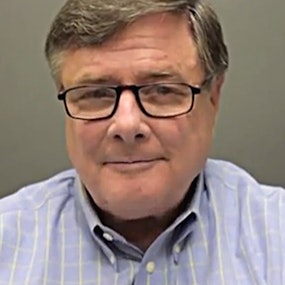
Stephen Hawley Martin
Author
As the talk show host of a popular weekly internet podcast from 2007 through 2009, “The Truth About Life,” it became clear to bestselling author Stephen Hawley Martin as he interviewed dozens of near death survivors, psychics, researchers into the paranormal, as well as quantum physicists and medical doctors, that humankind is on the cusp of a transition to a new understanding of the true nature of reality. To share what he has learned and to help speed the transition, which he believes will result in a rebirth of optimism and the world becoming a better place to live and work, he has written well over a dozen books, many of which have achieved bestseller status on Amazon. Martin is a former principal of the world renowned ad firm that created the GEICO Gecko and “Virginia Is For Lovers,” The Martin Agency, and is currently the editor and publisher of The Oaklea Press. He is the only three-time winner of the Writer's Digest Book Award, having won first prize twice for fiction and once for nonfiction, and he has also won First Prize for Visionary Fiction from Independent Publisher and First Prize for Nonfiction from USA Book News.












